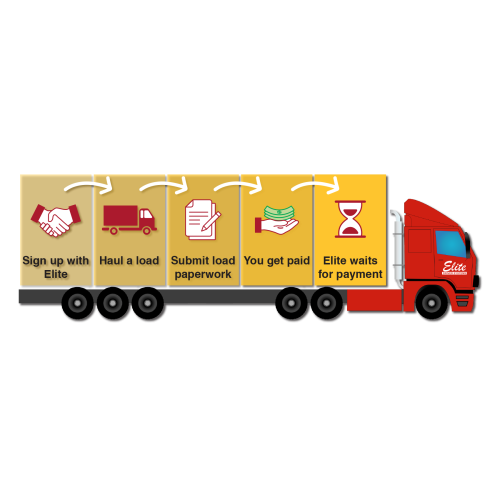10 Tips for Optimizing Back-Office Operations in Your Trucking Company
When it comes to trucking, it’s easy to get caught up in the hustle of moving loads and hitting deadlines. But what happens behind the scenes is just as crucial to your company’s success. Efficient back-office operations are the backbone of any thriving trucking business, ensuring that everything from payroll to compliance runs smoothly. Whether you’re a seasoned veteran or a newcomer to the industry, optimizing these processes can lead to significant savings, improved productivity, and ultimately – more time on the road with less stress! Buckle up as we dive into our top ten tips designed specifically for trucking companies ready to rev up their operations and drive towards greater efficiency. Let’s hit the road toward operational excellence together!
Importance of Efficient Back-Office Operations for Small Trucking Companies
In the trucking industry, back-office operations play a crucial role in the success of a company. While many small trucking companies may prioritize their on-the-road operations, neglecting the efficiency of their back-office can have serious consequences.
Efficient back-office operations are essential for small trucking companies for several reasons. First and foremost, they help to ensure that all administrative tasks are carried out accurately and in a timely manner. This includes handling paperwork related to shipments, processing invoices and payments, managing payroll and employee records, and maintaining compliance with regulations.
Without efficient back-office operations, these tasks can become overwhelming and quickly lead to errors or delays. These mistakes can result in lost time and money for the company, as well as damage to its reputation with clients.
Furthermore, efficient back-office operations allow for better organization and tracking of important data. This includes fuel expenses, maintenance costs, and other financial records. By keeping track of this information effectively, small trucking companies can gain valuable insights into their expenditures and make informed decisions about cost-saving measures.
Effective back-office operations also contribute to improved communication within the company. With streamlined processes in place for managing paperwork and data entry, employees can easily access necessary information without facing delays or confusion. This leads to better coordination between different departments within the company.
Another important reason why efficient back-office operations are crucial for small trucking companies is that they provide a competitive edge in an industry where profit margins can be slim. By optimizing administrative processes such as billing and invoicing, companies can save time and resources which can then be reinvested into improving other areas of the business.
Moreover, efficient back-office operations play a significant role in maintaining regulatory compliance. Trucking companies must adhere to various state and federal regulations regarding driver hours-of-service logs, vehicle inspections, fuel usage reporting among others. Failure to comply with these regulations can result in hefty fines or even suspension of operating licenses.
Efficient back-office operations are vital for the success and sustainability of small trucking companies. By prioritizing the optimization of administrative tasks, these companies can improve their overall efficiency, reduce costs, enhance communication and maintain compliance with regulations.
Tip 1: Automate Repetitive Tasks with Software and Technology
In today’s fast-paced business world, time is of the essence. For trucking companies, this is especially true when it comes to back-office operations. Every minute spent on manual and repetitive tasks could mean lost opportunities for growth and profitability.
Thankfully, with the advancement of technology, there are now various software and tools available that can streamline and automate these mundane tasks. Here are some tips on how you can leverage software and technology to optimize your back-office operations:
- Identify Repetitive Tasks: The first step in automating your back-office operations is to identify which tasks are taking up a significant amount of time and resources. These could include data entry, invoice generation, payroll processing, or even route planning. By identifying these tasks, you can prioritize which ones to automate first.
- Choose the Right Software: Once you have identified the repetitive tasks that need automation, it’s essential to choose the right software or tool for the job. There are numerous options available in the market specifically designed for trucking companies such as transportation management systems (TMS), fleet management software, and accounting programs.
- Integrate Systems: To ensure seamless automation of your back-office operations, it’s crucial to integrate different systems within your company. This will allow different departments to access real-time information and eliminate any duplication of efforts.
- Embrace Electronic Documents: Traditional paperwork can be time-consuming and prone to errors. By transitioning to electronic documents through tools like document management software or electronic signature platforms, you can save time and improve accuracy in record-keeping.
- Utilize Mobile Apps: With advancements in mobile technology, there are now apps designed specifically for trucking companies that offer features like GPS tracking, load matching services, fuel optimization tools, among others. These apps not only streamline processes but also provide real-time visibility into your fleet’s activities.
By automating repetitive tasks with suitable software and technology solutions tailored for the trucking industry, you can improve efficiency and productivity in your back-office operations. Additionally, automation can also free up time for your employees to focus on more critical tasks that require human intervention.
Embracing technology and leveraging software solutions is crucial for optimizing back-office operations in trucking companies. It not only saves time but also reduces costs, improves accuracy, and ultimately leads to better customer service. So don’t hesitate to explore the different options available and find the right tools that fit your company’s needs.
Tip 2: Streamline Communication and Collaboration
Communication and collaboration are crucial elements for the smooth functioning of any back-office operations in a trucking company. Without effective communication and collaboration, tasks can become delayed, mistakes can happen, and overall productivity can suffer. Therefore, it is essential to streamline these aspects to ensure optimal performance and efficiency.
- Implement a centralized communication system: One of the first steps towards streamlining communication is by implementing a centralized system that allows all team members to communicate effectively. This could be in the form of an internal email system or a project management tool that allows for real-time messaging and updates. Having a central hub for all communication ensures that everyone is on the same page, information is not lost or misinterpreted, and tasks can be assigned efficiently.
- Define roles and responsibilities clearly: In any organization, clarity in roles and responsibilities is crucial for effective teamwork. In a trucking company’s back-office operations, this becomes even more critical as different tasks need to be completed within tight timelines. By defining each team member’s role clearly, there will be no confusion about who should handle which task, avoiding duplication of efforts or delays due to uncertainty.
- Encourage open communication: Encouraging open communication among team members helps foster transparency and trust within the organization. Employees should feel comfortable sharing their opinions, ideas, concerns without fear of judgment or criticism from their superiors. This open flow of communication also allows for better problem-solving as issues can be addressed promptly rather than being swept under the rug.
- Utilize technology: Technology has revolutionized how we communicate and collaborate with others in our personal lives; why shouldn’t it do the same for our work? There are many tools available that facilitate seamless communication and collaboration among team members regardless of their physical location. These tools include video conferencing platforms like Zoom or Skype, project management software like Trello or Asana, file-sharing systems like Google Drive or Dropbox – all designed to improve communication and collaboration in a virtual environment.
- Schedule regular check-ins: Even with the best communication systems in place, it is essential to have regular check-ins with team members to ensure that everything is running smoothly. These can be weekly or bi-weekly meetings where everyone can provide updates on their tasks, discuss any challenges they may be facing, and address any concerns. This allows for timely problem-solving and ensures that everyone is on track towards achieving their goals.
Streamlining communication and collaboration is crucial for optimizing back-office operations in a trucking company. By implementing a centralized system, defining roles clearly, encouraging open communication, utilizing technology, and having regular check-ins – your team will be able to work together effectively and efficiently towards the common goal of improving overall performance.
Tip 3: Implement a Paperless System
In this digital age, it’s becoming increasingly important for businesses to adopt paperless systems in order to streamline operations and reduce costs. This is especially true for trucking companies, which deal with a large amount of paperwork on a daily basis. By implementing a paperless system, you can not only save time and money but also improve efficiency and sustainability in your back-office operations.
Here are some key steps to help you successfully implement a paperless system in your trucking company:
- Invest in the Right Technology: The first step towards going paperless is investing in the right technology. This includes document management software, scanners, and cloud storage solutions. Document management software allows you to scan, organize, and store documents electronically, making them easily accessible from anywhere at any time. Scanners enable you to digitize physical documents quickly and efficiently. Cloud storage solutions provide secure online storage for all your electronic files.
- Digitize Existing Documents: Before implementing a paperless system, it’s essential to digitize all existing paperwork such as invoices, receipts, bills of lading, etc. This can be done using scanners or by outsourcing the task to a document scanning service provider. Once digitized, these documents can be uploaded onto your document management software or cloud storage solution.
- Export All New Documents Electronically: Once you have implemented the necessary technology and digitized all existing documents, make sure that all new documents are exported electronically instead of being printed out on paper. This will ensure that they are automatically stored on your chosen platform without requiring any additional effort.
- Establish Clear Guidelines: It’s essential to establish clear guidelines for employees regarding the use of the new paperless system. This includes instructions on how to scan and upload documents correctly as well as how to access them when needed. Training sessions may also be necessary initially to ensure that everyone is comfortable with using the new system.
- Secure Your Electronic Documents: With the rise of cyber threats, it’s crucial to secure all electronic documents by implementing appropriate security measures. This includes password protection and encryption for sensitive information.
By following these steps and implementing a paperless system in your trucking company, you can save time, reduce costs, improve efficiency, and contribute to a more sustainable future. So don’t wait any longer – start going paperless today!
Tip 4: Regularly Review and Update Financial Processes
As a trucking company, it is crucial to have efficient and effective financial processes in place. This involves everything from invoicing and billing to payroll and expense tracking. However, these processes can become outdated or inefficient over time, hindering the overall productivity and profitability of your business.
Regularly reviewing and updating your financial processes is essential for keeping your back-office operations running smoothly. Here are some key reasons why this should be a priority for your trucking company:
- Keep up with industry changes: The trucking industry is constantly evolving, with new regulations, technologies, and market conditions emerging all the time. As such, it’s critical to regularly review and update your financial processes to ensure they align with current industry standards. For example, if there are changes in taxation laws or fuel prices, you may need to adjust your budgeting or expense tracking methods accordingly.
- Identify inefficiencies: By reviewing your financial processes on a regular basis, you can identify any inefficiencies that may be costing your business time and money. This could include manual data entry errors, redundant steps in the invoicing process, or outdated software systems that slow down operations. By pinpointing these issues early on, you can make necessary adjustments to improve the efficiency of your back-office operations.
- Ensure accuracy: Inaccurate financial records can lead to serious problems for any business – including trucking companies. Regularly reviewing and updating your financial processes helps ensure that all transactions are recorded accurately in real-time. This minimizes the chances of errors or discrepancies occurring which could result in lost revenue or operational setbacks.
- Improve cash flow management: Efficient financial processes allow for better cash flow management by reducing delays in receiving payments from clients or making timely payments to vendors and employees. By regularly reviewing these processes, you can identify any bottlenecks that may be affecting cash flow and address them promptly.
- Increase profitability: Ultimately, optimizing your financial processes can lead to increased profitability for your trucking company. By streamlining operations and reducing costs, you can improve your bottom line and drive growth for your business.
Regularly reviewing and updating financial processes is crucial for the success of any trucking company. It helps you stay current with industry standards, identify inefficiencies, ensure accuracy in records, improve cash flow management, and increase profitability. Make it a priority to periodically review and update your financial processes to keep your back-office operations running at their best.
Tip 5: Outsource Non-Core Tasks
As a trucking company owner or manager, your main focus should be on efficiently managing the transportation of goods and ensuring customer satisfaction. However, there are numerous non-core tasks that come with running a business which can take up a significant amount of time and resources. These tasks may include administrative work such as bookkeeping, payroll processing, and human resources management.
Outsourcing non-core tasks is becoming increasingly popular among businesses of all sizes and for good reason. It allows companies to focus on their core competencies while delegating non-essential tasks to external service providers who specialize in those areas. Here are some key benefits of outsourcing non-core tasks in your trucking company:
- Time-Saving: Outsourcing non-core tasks can save you and your team valuable time which can be better utilized towards more essential activities such as client acquisition or improving operations. By handing over these responsibilities to experts, you can trust that they will be completed efficiently without taking up much of your time.
- Cost-Effective: Hiring full-time employees to handle non-core tasks can add up significantly in terms of salary, benefits, training costs, and office space expenses. On the other hand, outsourcing allows you to pay only for the services you need when you need them without any additional overhead costs.
- Access to Expertise: When you outsource non-core tasks, you gain access to highly skilled professionals who have expertise in their respective fields. This means that the quality of work will likely be higher compared to if it were done by an employee who may not have specialized knowledge in that area.
- Greater Flexibility: As your trucking company grows or experiences fluctuations in demand for services, the volume of back-office work may also change accordingly. By outsourcing these tasks, you have the flexibility to scale up or down based on your current needs without having to worry about hiring or laying off employees.
- Enhanced Efficiency: With non-core tasks being handled by external experts, you can expect them to be completed in a more efficient and timely manner. This can lead to improved productivity for your business as a whole.
Outsourcing non-core tasks offers numerous benefits for trucking companies looking to optimize their back-office operations. By freeing up time and resources, improving efficiency, and gaining access to specialized expertise, outsourcing can help streamline your business processes and contribute to its overall success. So don’t hesitate to consider outsourcing options for non-core tasks in your trucking company today!
Tip 6: Utilize Data Analytics for Better Decision Making
In today’s fast-paced business environment, data is the key to making informed and strategic decisions. This rings especially true for trucking companies, where back-office operations play a crucial role in the overall success of the business. With the help of data analytics, trucking companies can gain valuable insights and make data-driven decisions that can significantly improve their back-office operations.
Data analytics refers to the process of collecting, organizing, and analyzing large sets of data to uncover patterns, trends, and correlations that can aid decision-making. By utilizing various tools and techniques such as statistical analysis, predictive modeling, and machine learning algorithms, trucking companies can gain a deeper understanding of their operations and identify areas for improvement.
One of the primary benefits of using data analytics in back-office operations is increased efficiency. By analyzing data on various aspects such as fuel consumption, maintenance costs, driver performance, and route optimization, trucking companies can identify inefficiencies and make necessary adjustments to improve overall productivity. For instance, by identifying routes with higher fuel consumption or drivers with lower performance rates through data analysis, companies can take corrective measures such as optimizing routes or providing additional training to drivers.
Moreover, data analytics also enables better forecasting capabilities for trucking companies. By analyzing historical data on factors like customer demand patterns and market trends, businesses can make more accurate predictions about future demands. This allows them to plan ahead effectively and ensure that they have sufficient resources available to meet customer needs while minimizing any potential disruptions in their supply chain.
Another significant benefit of utilizing data analytics in back-office operations is cost savings. By spotting areas where costs are high or unnecessary expenses occur through careful analysis of financial records or invoices using specialized tools or software programs specifically designed for this purpose – businesses can reduce operating costs significantly.
Tip 7: Train and Empower Employees to Handle Back-Office Tasks
In any trucking company, the back-office operations play a crucial role in keeping the business running smoothly. However, with the constant pressure of managing day-to-day tasks and meeting tight deadlines, it can be challenging to keep up with all the back-office responsibilities. This is where having well-trained and empowered employees can make a significant difference.
The success of your company’s back-office operations heavily relies on the skills and knowledge of your employees. Therefore, investing in their training and development is vital for optimizing these operations. By providing them with the necessary tools and resources, you can empower them to handle various back-office tasks efficiently.
Firstly, start by identifying the key areas that require training within your back-office team. This could include software systems used for dispatching, invoicing or accounting processes, data entry procedures, or even customer service techniques. Once these areas have been identified, create a structured training program that covers all these aspects comprehensively.
It is essential to ensure that this training is not just a one-time event but an ongoing process. As technology continues to advance rapidly in the trucking industry, it is crucial to keep your employees up-to-date with new systems and processes through regular training sessions.
Additionally, cross-training employees in different departments can also be beneficial for optimizing back-office operations. This will not only give them a better understanding of how different tasks are interconnected but also allow for more flexibility when dealing with unexpected situations or staffing shortages.
Another way to empower your employees is by giving them ownership of certain tasks within the back office. This means assigning each employee specific responsibilities rather than expecting everyone to take on every task equally. By doing so, you not only build trust within your team but also ensure that there is always someone who takes charge of specific duties if another employee is unavailable.
Provide opportunities for growth and advancement within your company. This can be in the form of promotions, salary increases, or even offering them to attend relevant workshops and conferences. By showing that you value their contributions and are willing to invest in their development, you create a happier and more motivated workforce.
Proper training and empowerment of employees are crucial for optimizing back-office operations in your trucking company. By investing in their skills and knowledge, you ensure that all tasks are handled efficiently while also fostering a positive working environment.
Tip 8: Regularly Monitor and Analyze Key Performance Indicators
Regularly monitoring and analyzing key performance indicators (KPIs) is crucial for optimizing back-office operations in your trucking company. KPIs are quantifiable measures that reflect the success or failure of a particular process or activity within your organization. By consistently tracking these metrics, you can identify areas of improvement and make data-driven decisions to enhance the efficiency and profitability of your business.
The first step in effectively monitoring KPIs is to determine which ones are most relevant to your company’s goals and objectives. This will vary depending on the size, structure, and focus of your trucking company. However, some common KPIs for back-office operations include driver turnover rate, average revenue per mile, on-time delivery percentage, cost per mile, and accounts receivable days outstanding.
Once you have identified the key metrics to monitor, it is essential to establish a regular reporting schedule. This could be daily, weekly, or monthly depending on the level of detail needed for each specific KPI. It’s also important to ensure that the data being collected is accurate and consistent by using standardized methods for measurement and recording.
Analyzing KPI data can provide valuable insights into areas that require improvement or optimization within your back-office operations. For example, if you notice a significant increase in driver turnover rate over a few months’ time, it may indicate issues with employee satisfaction or retention strategies. By addressing these concerns promptly, you can prevent potential disruptions to your business operations.
Another benefit of regularly monitoring KPIs is identifying trends over time. By comparing current data with historical information, you can track progress towards specific goals or target benchmarks for performance improvement. This allows you to make necessary adjustments in real-time before they become significant challenges.
It’s also crucial to involve all relevant stakeholders in the analysis process. Share reports with managers or team leaders responsible for specific departments so they can understand how their contributions impact overall performance metrics. Additionally, encourage open communication and collaboration among team members to brainstorm strategies for improvement based on the KPI data.
Regularly monitoring and analyzing KPIs is a critical practice for optimizing back-office operations in your trucking company. It allows you to identify areas of improvement, track progress towards goals, and make data-driven decisions to enhance overall efficiency and profitability. By implementing a systematic approach to tracking and analyzing KPIs, you can stay ahead of potential challenges and continually improve your business operations.
Tip 9: Invest in Quality Control Measures
As a trucking company, ensuring the quality of your services is crucial for maintaining customer satisfaction and a good reputation in the industry. This is where investing in quality control measures becomes essential. Quality control refers to processes and systems put in place to monitor and maintain the standard of products or services being delivered.
In the trucking industry, quality control measures can include everything from regularly inspecting and maintaining trucks, training drivers on safe driving practices, to monitoring delivery efficiency and accuracy. The aim is to identify any issues early on and address them before they turn into bigger problems.
One of the first steps towards implementing quality control measures is establishing clear standards for your operations. This includes defining what constitutes as acceptable performance levels for different aspects of your business such as vehicle maintenance, driver conduct, and delivery times. These standards should be communicated clearly to all employees involved in these processes.
Regularly scheduled inspections are also an important aspect of quality control. This involves performing routine checks on vehicles, equipment, and facilities to ensure that they meet safety regulations and are functioning properly. Any identified issues should be addressed immediately to avoid potential breakdowns or accidents.
Investing in technology can also greatly improve your quality control efforts. There are various software solutions available that can help track delivery times, monitor fuel consumption rates, and even provide real-time updates on driver behavior such as speeding or harsh braking. These tools can provide valuable insights into areas that need improvement and help you make data-driven decisions.
Another crucial aspect of quality control is training your drivers effectively. Not only does this ensure their safety on the road but also plays a significant role in delivering goods efficiently. Drivers should be trained on proper loading techniques, defensive driving skills, route planning strategies, as well as how to handle unexpected situations such as bad weather conditions or vehicle malfunctions.
It’s important to regularly review your quality control processes and make necessary adjustments. Continuously monitoring and evaluating the effectiveness of your measures can help identify areas for improvement and ensure that your operations are running smoothly.
Investing in quality control measures is a vital step towards optimizing back-office operations in your trucking company. By setting clear standards, conducting regular inspections, utilizing technology, and providing proper training to your drivers, you can ensure the quality of your services and maintain a competitive edge in the industry.
TIP 10: Consider Factoring your Freight Invoices
One of the biggest challenges for trucking companies is managing cash flow. With the long payment cycles in the industry, it can be difficult to keep up with expenses such as fuel, maintenance, and payroll. This is where factoring can be a game-changer for your back-office operations.
Factoring is a financial service that provides immediate cash flow by selling your outstanding invoices to a third-party company at a discount. Essentially, you are getting paid for your work upfront instead of waiting for shippers or brokers to pay you. This helps to bridge the gap between delivery and payment.
The benefits of factoring go beyond just improving cash flow. It also eliminates the need for collections and reduces administrative tasks associated with billing and invoicing. By partnering with a factoring company, they will take on the responsibility of collecting payments from clients, freeing up time and resources for other important tasks within your back-office operations.
Moreover, factoring can also help reduce bad debt risk. If a client fails to pay or goes bankrupt, it is the factoring company’s responsibility to absorb the loss rather than yours. This can provide peace of mind knowing that your business is protected from potential financial setbacks.
When considering factoring for your freight invoices, it is essential to do thorough research and choose a reputable company with experience in working with trucking companies specifically. They should have competitive rates and transparent terms so that you fully understand the cost involved. Elite Driver Systems may be just the right fit for you. Click here to learn more and get signed up with us today.
If you are struggling with cash flow management in your trucking company or looking to streamline your back-office operations, factoring may be worth considering. It can provide an immediate solution to cash flow challenges and free up time and resources for other important tasks. Just make sure to do your due diligence and choose a reputable factoring company that meets your specific needs.

 Toll Free: 1.888-337-3432
Toll Free: 1.888-337-3432 Email us: info@elitedriversystems.com
Email us: info@elitedriversystems.com







